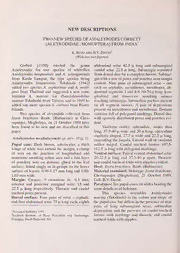
Two new species of Asialeyrodes Corbett (Aleyrodidae: Homoptera) from India PDF
Preview Two new species of Asialeyrodes Corbett (Aleyrodidae: Homoptera) from India
. NEW DESCRIPTIONS TWO NEW SPECIES OFAS1ALEYRODES CORBETT (ALEYRODIDAE HOMOPTERA) FROM INDIA1 : K. REGU AND B.V. DAVID2 (With two text-figures) Corbett (1935) erected the genus abdominal setae 42.5 p long and submarginal Asialeyrodes for two species of whiteflies caudal setae 22.5 p long. Submargin separated Asialeyrodes lumpurensis and A. selangorensis from dorsal disc by a complete furrow. Submar- from Kuala Lumpur, the type species being gin with a row of pores and porettes near margin Asialeyrodes lumpurensis. Takahashi (1942) evident. Nine pairs of submarginal setae - one added two species A. euphorbiae and A. multi- each on cephalus, mesothorax, metathorax, ab- pori from Thailand and suggested a new com- dominal segments and 4-8, 60-70 p long. Lon- 1 bination A. maesae for Pseudaleuro/obus gitudinal and transverse moulting sutures maesae Takahashi from Taiwan, and in 1949 he reaching submargin. Submedian pockets present added one more species A. corbetti from Riouw on all segment sutures. A pair of depressions Islands. present on mesothorax and metathorax. Dorsum Two species of aleyrodids collected from contains full of polygonal markings. Dorsal disc Ixora brachiata Roxb. (Rubiaceae) at Cher- with sparsely distributed pores and porettes evi- rapunjee, Meghalaya, on 21 October 1989 have dent. ' been found to be new and are described in this Vasilorm orifice subcordate, wider than paper. long, 37.5-40 p wide and 30 p long; operculum similarly shaped, 27.5 p wide and 22.5 p long, Asialeyrodes meglialayensis sp. nov. (Fig. 1) concealing the lingula. Lateral wall of vasilorm Pupal case: Dark brown, subcircular, a thick orifice ridged. Caudal tracheal furrow 107.5- fringe of white wax around the margin, a clump 12.5 u long with polygonal markings. 1 of wax on the junction of longitudinal and Ventral surface: Paired ventral abdominal setae transverse moulting suture area and a thin layer 20-22.5 p long and 37.5-40 p apart. Thoracic of powdery wax on dorsum; glued to the leaf and caudal tracheal folds with stipples evident. surface; found singly or in groups on the lower Host: Ixora brachiata Roxb. (Rubiaceae) mm surface of leaves; 0.98-1.17 long and 0.80- Material examined: Holotype. Ixora brachiata, mm 1.03 wide. Cherrapunjce (Meghalaya), 21 October 1989, Margin: Crenate, 9 cremations in 0.1 mm; Coll. B.V. David. anterior and posterior marginal setae 15 and Paratypes: Six pupal cases on slides bearing the 22.5 p long respectively. Thoracic and caudal same details as of holotype. tracheal pores present. This species resembles Asialeyrodes Dorsal surface: Four pairs of setae - cephalic maesae (Takahashi) in the colour and shape of and first abdominal setae 75 p long each, eighth the pupal case but differs in the presence of nine pairs of long submarginal setae, submedian depressions and the presence of caudal tracheal 1Accepted I'ebruary 1991 "Fredrick Institute of Plant Protection and Toxicology, furrow with markings and thoracic and caudal Padappai, Tamil Nadu 601 301. tracheal folds with stipples. NEWDESCRIPTIONS 257 °'01 0.lrmn 0.01 mm Fig. 1 .Asialeyrocles niegha/ayensis sp. nov. A. PupilI case, B. Margin with thoracic tracheal pore, C. Vasiform orifice. region. A row of four pairs of subdorsal setae Asialeyrodes papillatus sp. nov. (Fig. 2) near the submargin on abdominal segments 4-8, Pupal case: Milky white with a thin layer of 2.5 p long each. Dorsum contains full of wax over the submargin; subcircular, broadest at polygonal markings. Submargin with a row of mm the transverse moulting suture area, 0.82 about 27 pairs of pores and porettes near the mm long and 0.71 wide; found on the lower sur- submarginal furrow and dorsal disc with about face of leaf. 44 pairs of pores and porettes - 20 on the Margin: Smooth; anterior and posterior mar- cephalothorax and 24 on the abdomen, sparsely ginal setae 12.5 p long each; thoracic and caudal distributed. tracheal pores with chitinised rim. Vasiform orifice subcircular, wider than Dorsal surface: Two pairs of setae - cephalic long, 40 p wide and 25 p long; operculum and eighth abdominal setae each 2.5 p long; first similarly shaped, filling the orifice, concealing abdominal and caudal setae absent. Submargin the lingula. Lateral wall of vasiform orifice separated from dorsal disc by a broad and com- ridged. Caudal tracheal furrow long, 87.5 p with plete furrow. Submarginal furrow contains full small dotted markings. Thoracic tracheal furrow of thick papilla-like (3-4 rows) structures. Lon- slightly discernible. gitudinal and transverse moulting sutures reach- Ventral surface: Paired ventral abdominal setae ing submargin. Abdominal segment sutures 1-6 5 u long and 35 p apart. Thoracic tracheal folds are marked by thin papilla-like structures. From distinct, whereas caudal tracheal fold indistinct. the first abdominal segment suture a row of Round markings on dorsal disc evident. A papilla-like structures extends to the cephalic minute seta at the base of each mesothoracic and 258 JOURNAL, BOMBAYNATURALHIST. SOCIETY, Vol. 88 Fig. 2:Asialeyrodespapillatus sp. nov. A. Pupal case, B. Margin with thoracic tracheal pore, C. Vasiform orifice with caudal tracheal furrow. metathoracic leg 3.75 pi long. ACKNOWIJEDGEMFNIS Host: Ixora brachiata Roxb. (Rubiaceae) Material examined: Holotype. Ixora brachiata Thanks are due to S. James Fredrick, , Cherrapunjee (Meghalaya state), 21 October Chairman, FIPPAT, for facilities provided and to 1989, Coll. B.V. David. Dr. (Mrs) Almeida, Professor of Botany, St. This species differs from all the other known Xavier’s college, Bombay, fcrr getting the host species ofAsialeyrodes in the presence of papilla- plant identified. like structures in the submarginal furrow. References <s Corbett, G.H. (1935): Malayan Aleyrodidae. J. fed. Malay China. Trans, nat. hist. soc. Formosa 32 : 204-207. St. Mus. 17: 841-843. Takahashi, R. (1949) : Some Aleyrodidae from the Riouw Is- Takahashi, R. (1942) Some foreign Aleyrodidae (Hemip- lands (Homoptera). Mushi 20: 51-52. : tera) VI. Species from Thailand and French Indo-
